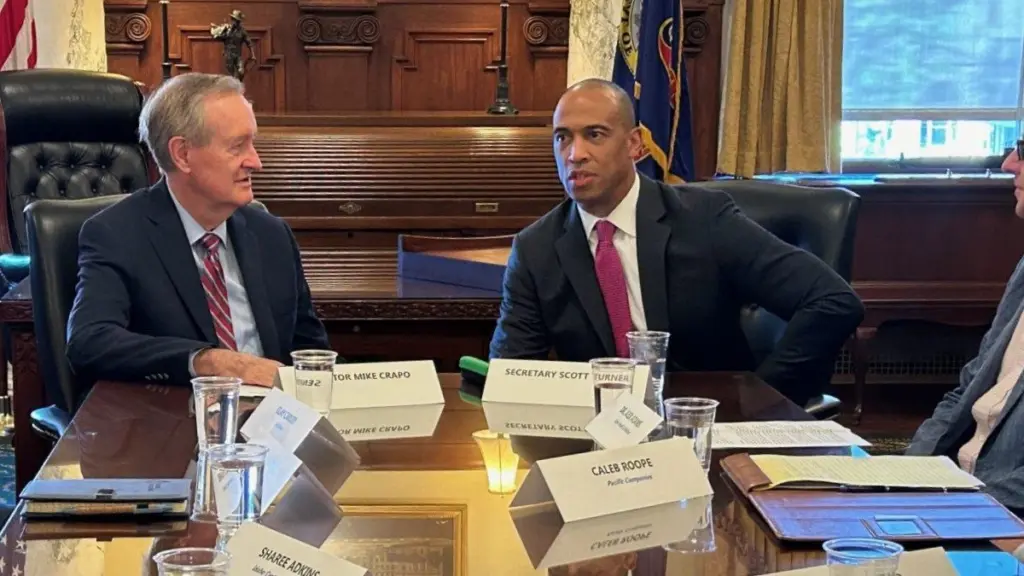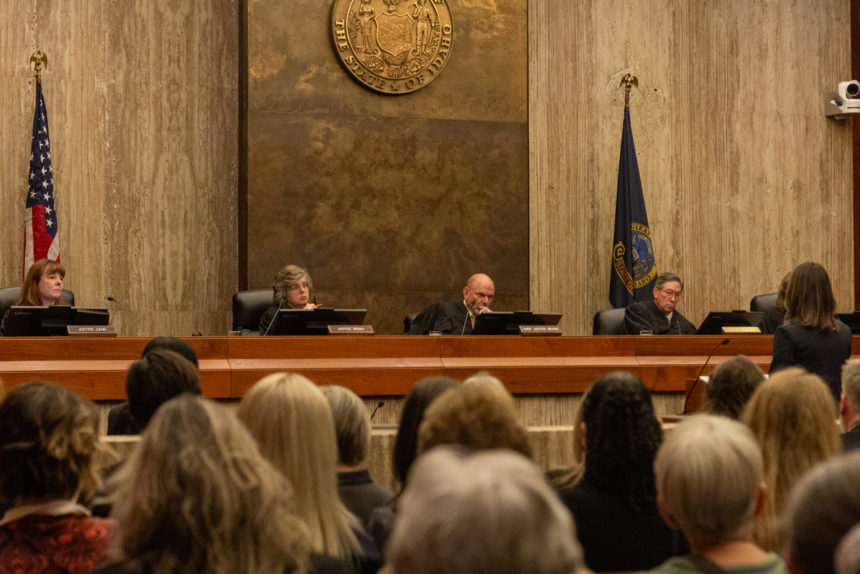BOISE, ID U.S. Secretary of Housing and Urban Development Scott Turner stated on Tuesday that housing availability and affordability are major concerns for Americans nationwide, and this is also true in Idaho.
Turner spoke about the needs and difficulties facing the Gem State at the Idaho Capitol in Boise alongside U.S. Sen. Mike Crapo, R-Idaho, and a number of state and local housing leaders.
In his opening remarks, Crapo stated that one of the most widespread problems impacting employers and workers in Idaho is access to affordable housing. It’s one of the most common, if not the most common, concerns that Idahoans bring up with me and my team around the state.
Idaho Workforce Development Director Wendi Secrist, Idaho Department Health and Welfare Director Alex Adams, Idaho Housing and Finance Association Executive Director Gerald Hunter, Pacific Companies CEO Caleb Roope, Old Boise CEO Clay Carley, City of Boise Director of Housing and Homelessness Policy Nicki Hellenkamp, and other representatives from the public and private sectors participated in the roundtable discussion, which was closed to the media.
After the group’s roughly 30-minute meeting, Crapo and Turner spent nearly ten minutes fielding questions from the media.
Crapo stated on Tuesday that his office has been examining a housing survey that was carried out from March 31 to May 31 and that one of the main concerns was housing affordability.
A preliminary findings summary from Crapo’s office found that many of the 5,000 Idahoans who replied felt that local wages did not keep up with rising housing costs. According to Crapo’s team, specific figures were not yet available.
In a subsequent interview with the Idaho Capital Sun, the senator stated that the two main grievances he is receiving throughout the state are that the prices are too high and there is not enough supply.
In the significant tax and spending plan that Congress signed into law in July, Obama emphasized the extension and growth of the federal Low-Income Housing Tax Credit, which offers tax incentives to developers who construct affordable housing units. Through the two credit kinds offered in the program, the law permanently increases the number of credits that will be available for qualifying projects.
Under one credit program, developers can deduct around 9% of their building costs annually for ten years. The Internal Revenue Service sets a cap on this amount for each state each year. The measure added 12% to each state’s allotment.
Additionally, a credit equal to 4% of the project cost is provided by the program. Although the number of these credits that each state may receive is unlimited, it was mandatory that half of the project be funded by a certain kind of tax-exempt bond known as private activity bonds, which are subject to a cap. The bond requirement was reduced to 25% of the project under the bill.
According to Crapo, one of our goals is to try to lessen the main grievance that we’re finding in our survey, which is the cost of housing and the accessibility of affordable housing, by using the tax code to encourage the creation of capital around housing.
Turner, a Texas state politician and former NFL player, stated that lowering rules will be one of his top priorities in order to lower the cost of housing construction. He mentioned his decision to repeal the Affirmatively Furthering Fair Housing regulation, which was implemented under the Biden administration to address housing discrimination.
He claimed on Tuesday that the regulation effectively turned Washington, D.C., into a national zoning board.
Scott said that safety rules and regulations will not change when asked about them.
The removal of costly, redundant laws that cost developers and builders a lot of money can be a game changer, regardless of whether they choose to proceed with the project or not, Turner stated.
Crapo stated that he would push municipal governments to follow suit and that he also favored loosening restrictions on builders.
Turner also oversaw HUD’s Opportunity Zone program, an incentive scheme aimed at economically disadvantaged areas, during the first Trump administration. Tax incentives are offered for investments in various sectors, which are approved by the IRS and recommended by state representatives.
According to Idaho News 6, Turner claimed to have visited a food warehouse constructed in Twin Falls that was Idaho’s first opportunity zone project.
According to Turner, 4,000 new employment and 700 new housing units have been constructed in Idaho’s opportunity zones.
The opportunity zone program was also made permanent by the One Big Beautiful Bill Act, which became the main tax and spending statute.
According to the Associated Press, Turner made the case during his nomination hearing that housing aid, including public housing and Section 8 vouchers, need to have time restrictions. For able-bodied people, Turner and the Trump administration have suggested capping rental assistance programs at two years.
A Center on Budget and Policy Priorities fact report dated January 2025 states that 27,800 Idahoans have used federal rental assistance. Seniors make up 24% of individuals who require the support, those with disabilities make up 30%, and families with children make up 49%.
The majority of Section 8 users who would lose housing are those who have children, according to research from New York University that was cited by the AP.
Turner assured reporters on Tuesday that there is absolutely no fear that the suggested time constraints will force families to find other places to live.
According to Turner, government subsidies were never intended to be a luxury. Their purpose is to serve as a trampoline.
The Idaho Capital Sun was the first to publish this story.










